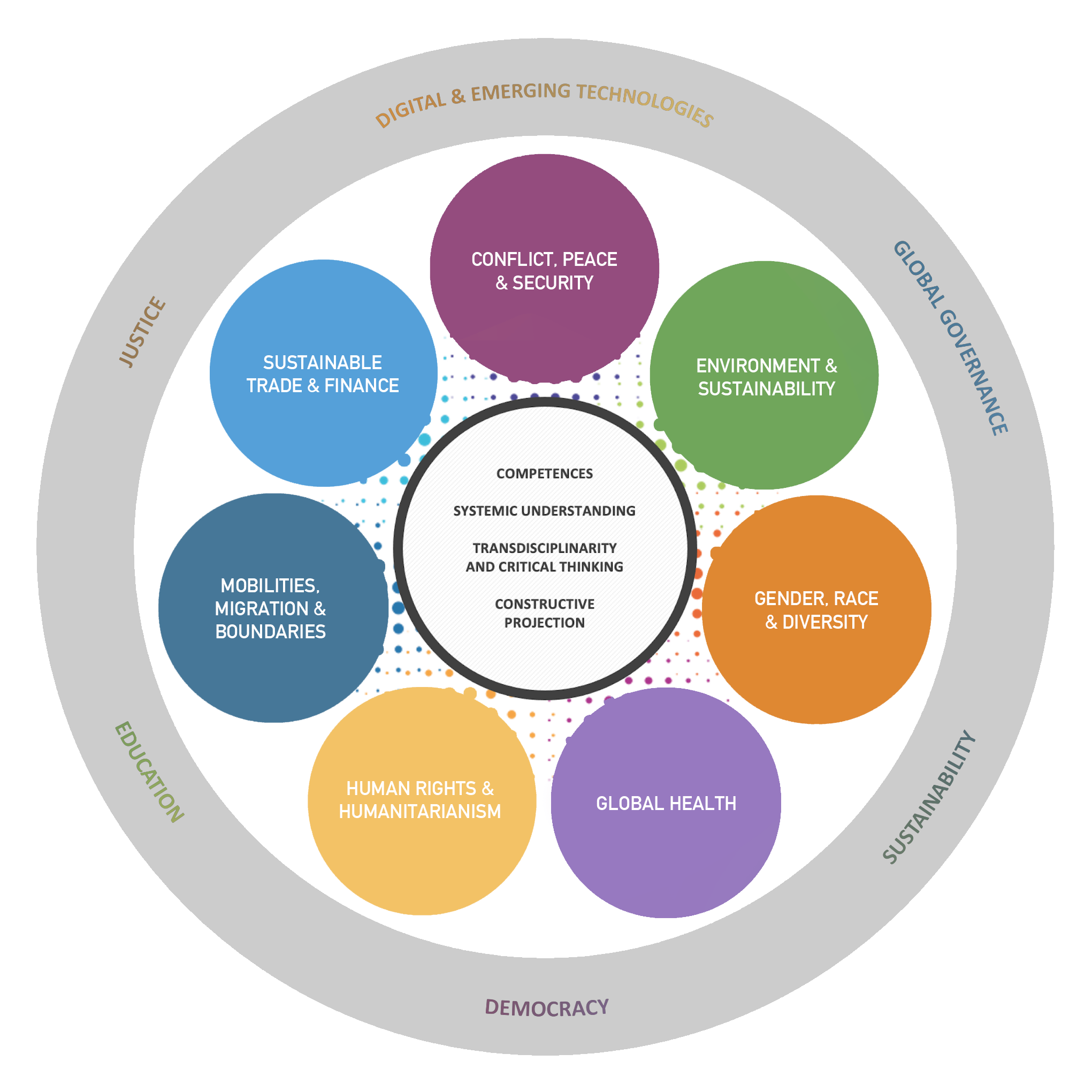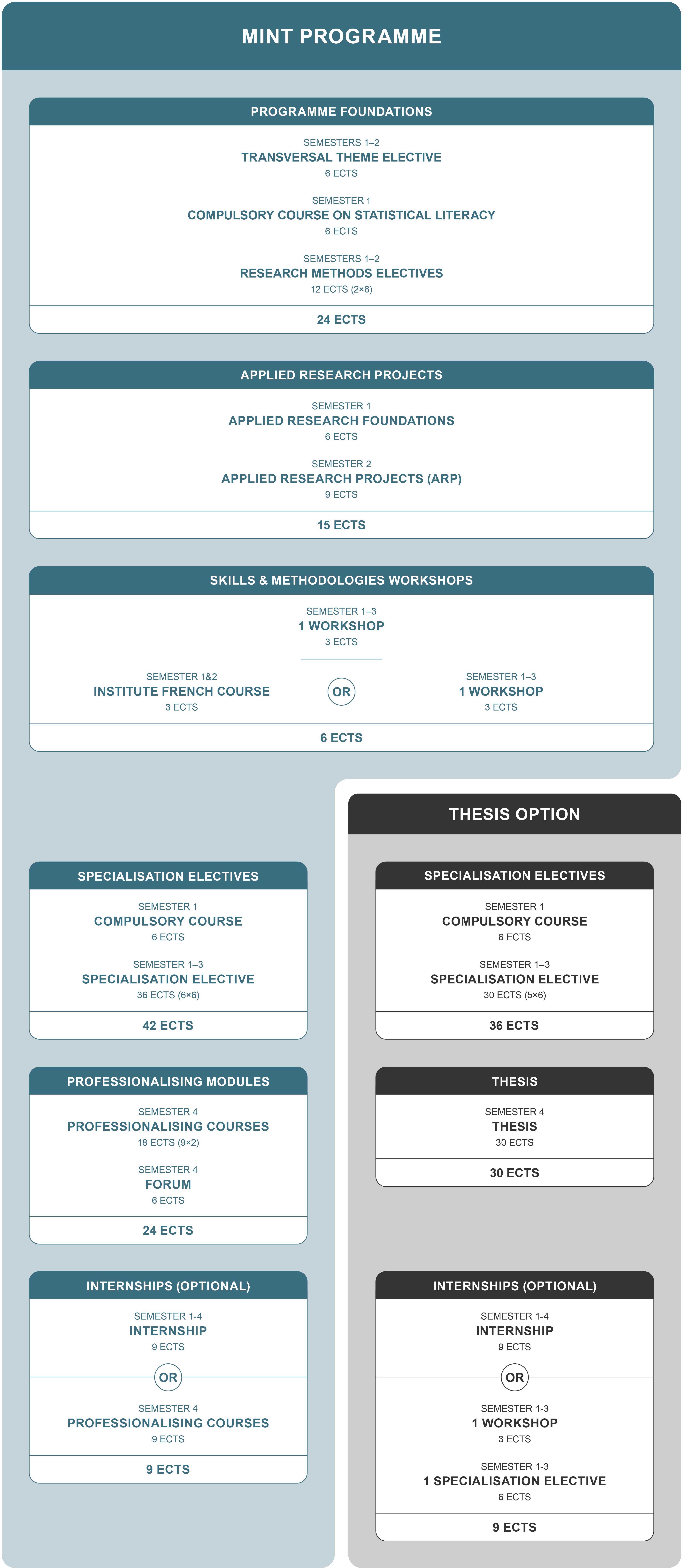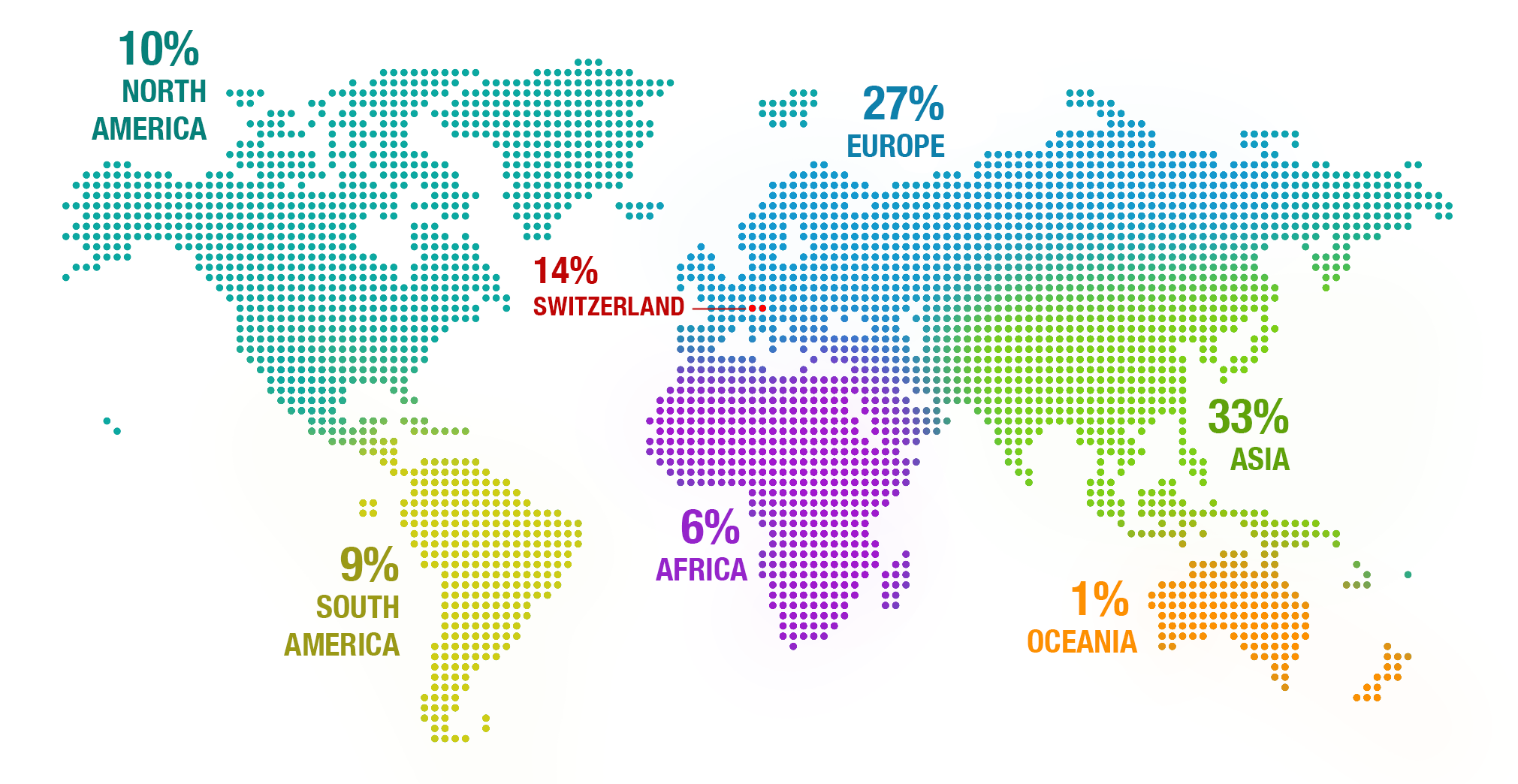becoming a generalist of a specific kind
Global challenges call for a new generation of professionals, working on creative solutions for a more sustainable, equitable and peaceful world. In this context, we believe that the best preparation is, on the one hand, a deep understanding of common systemic interdependencies enriched with thematic specialisations, and on the other, the fostering of adequate skills such as resilience, agility, innovative and critical thinking.
To that end, our Master in International and Development Studies ('MINT') proposes a ground-breaking combination of a solid common core with the possibility to specialise in one of seven areas. The MINT mixes the advantages of being a rigorous academic programme with a strong accent on applied research, practice (via the Applied Research Projects - ARPs) and skills, and is ideally located at the heart of International Geneva.
A programme for all those wanting to work in:
- International cooperation, in intergovernmental, non-governmental organisations, or national administrations.
- Private sector, notably multinational companies, the finance sector, law firms, consulting and public relations agencies.
- Research on global issues, such as in think tanks, international foundations, universities, in the media, or as a consultant.

TRANSVERSAL THEME ELECTIVES
Our transversal theme electives provide a unique opportunity to engage in an interdisciplinary manner with current global issues which transcend specialisations. By drawing on the expertise of the Institute and of International Geneva, these courses offer a creative space for reflection and are part of our programme foundations. The transversal themes are as follows:
- Sustainability;
- Democracy and Inequality;
- Fairness and Justice;
- Digital & Emerging Technologies;
- Global Governance;
- Education.
RESEARCH METHODS ELECTIVES
Part of the programme's foundations, they offer students different ways of analysing a given reality, and introduce them to new ways of thinking. They are eclectic, and encompass qualitative, quantitative, hybrid and legal / philosophical methods.
SPECIALISATIONS
They enable students to dive into one of the following seven areas:
- Conflict, Peace and Security;
- Environment and Sustainability;
- Gender, Race and Diversity;
- Human Rights and Humanitarianism;
- Mobilities, Migrations and Boundaries;
- Sustainable Trade and Finance;
- Global Health.
Students can choose the extent to which they specialise. However, because today's global issues are intertwined and can't be confined to a specific field, students will be encouraged to learn beyond a specialisation and explore their interlinkages.
SKILLS WORKSHOPS
They provide students with tools and practical skills needed for their applied research projects (ARPs) and for their professional lives.
APPLIED RESEARCH PROJECTS (ARP) & MASTER THESIS
The Applied Research Project on the one hand and the Master Thesis (optional) on the other allow for the synthetic and practical mobilisation of knowledge, methods, tools and skills acquired in the programme.
INTERNSHIPS (optional)
They provide students the opportunity to connect to the fertile International Geneva microcosm, to gain professional experience and to put their knowledge into practice.

Applicable as of September 2026
PROGRAMME FOUNDATIONS
- Transversal theme elective - S1 - S2
- Compulsory course on Statistical Literacy - S1
- Research methods electives - S1 - S2
SPECIALISATIONS
- Compulsory special course - S1
- Specialisation electives - S1 - S4
APPLIED RESEARCH AND PRACTICE
- Applied Research Foundations - S1
- Applied Research Projects (ARPs) - S2
- Skills workshops - S1 - S4
- Institute's French course - S1 - S4
INTERNSHIP (optional)
They provide students with the opportunity to connect with International Geneva, to gain professional experience and put their knowledge into practice.
PROFESSIONAL DEVELOPMENT*
- Professionalising courses - S4
- Career Forums - S4
THESIS OPTION
- Replace the professionalising courses and Career forums by a Master thesis - S4
*As of September 2026.
EXCHANGE SEMESTER (OPTIONAL)
Through our global network of prestigious academic partnerships, the Geneva Graduate Institute has established exchange programmes providing our students and students from other universities around the globe with the opportunity to participate in culturally stimulating educational experiences.
The programme is based on solid common foundations, to ensure students acquire the rigorous analytical framework and methodological bases they will need throughout the programme and in their professional lives.
1 | TRANSVERSAL THEME ELECTIVES
Students must validate one Transversal Theme Elective during their first year. Students can choose amongst a list of themes, as follows:
- Sustainability;
- Democracy and Inequality;
- Fairness and Justice;
- Digital & Emerging Technologies;
- Global Governance;
- Education.
Why do we think students need to learn about a transversal theme?
- MINT students need to gain a solid understanding of a current global challenge, or those transcend specialisations.
- Global challenges are important and pressing issues of global concern that require particular attention.
2 | COMPULSORY COURSE ON STATISTICAL LITERACY
Taken by all MINT Students during their first semester.
Why is this course important?
- In today’s world, it is crucial to know how to decipher, interpret and use with a critical eye, the quantitative information we receive on a daily basis.
- Statistical literacy (the ability to understand statistics) is one of the foundations for effective decision-making today.
This course establishes one of the methodological basis of the programme. As it is a beginner-level course, students with demonstrated knowledge of statistics can request a waiver (to be replaced by any other course).
3 | RESEARCH ELECTIVES
Students must validate two Research Electives during their first year. Students can choose amongst a list.
Categories are: quantitative methods, qualitative methods, hybrid methods and legal & philosophical methods.
Why Research Electives are part of the curriculum?
- They introduce students to new ways of thinking – they are methodological courses taught by experts / professors from different disciplines.
- Students need to acquire innovative perspectives on international affairs, and a critical-thinking mindset.
They aim at providing students with solid, interdisciplinary methodological foundations.
The MINT offers a common core and seven specialisations. Each of them follows an interdisciplinary approach, informed by the rich expertise of the Institute in five disciplines: anthropology and sociology, international economics, international history and politics, international law, and international relations and political science. Specialisations are not self-standing silos: they are interconnected curricula providing to students the possibility to tailor the programme to their needs, to a certain extent.
1 | CONFLICT, PEACE AND SECURITY
This specialisation focuses on the issues of conflict, peace and security and the interactions among them. It examines the drivers and manifestations of conflict, the nature and conditions of peace, and the determinants of security. Within an interdisciplinary approach, we survey the various historical and contemporary manifestations of these processes.
Some courses taught in 2024 – 25:
- Conflict Resolution and Peace Mediation in Times of Radical Uncertainty
- The Arab-Israeli Conflict
- Technology, Power, Global Governance
- The Evolution of Global Security
- The Economics of Institutions and Democratic Governance: Their functioning and impact on peace, development and sustainability
Head: Prof. Davide Rodogno
2 | ENVIRONMENT AND SUSTAINABILITY
This specialisation focuses on global environmental challenges, which lie at the heart of the search for a sustainable human future on Earth. It examines the impacts of contemporary political economies locally and at the planetary scale. It adopts an interdisciplinary approach to the understanding of the economics and politics of decisions about the environment, from the global scale (e.g. climate change or global ecology) to the local (e.g. agrarian change, biodiversity conservation, urbanisation or mining).
Some courses taught in 2024 – 25:
- International Environmental Law
- Environmental Economics and Policy
- Environmental Justice
- Economic Development of Resource-Rich Countries
- Water-Peace Diplomacy
Head: Prof. Shaila Seshia Galvin
3 | GENDER, RACE AND DIVERSITY
This specialisation addresses how power relations based on gender, race, and other forms of difference structure international affairs. The goal is to provide students with the knowledge, skills, and tools to help redress intersecting inequalities and oppressions globally. Students gain interdisciplinary training that addresses a broad range of topics, including histories of colonialism and decoloniality; anthropologies and sociologies of (anti)racism, sexuality and gender; the economics of gender and development; and the gendered and racialised politics of international governance and international law.
Some courses from 2024 – 25:
- Elites and Inequality
- Gender and Bodies in Global Health
- Race and Mobility: Historical and Contemporary Perspectives
- Gender, Sexuality and Decolonization in the Global South
- Intersectionality and International Relations: Feminist and Queer Resistance to the Canon
Head: Prof. Aditya Bharadwaj
4 | GLOBAL HEALTH
This specialisation focuses on power, politics and governance in global health. Students will learn how global health issues affect, and are affected by, geopolitics through global institutions and transnational actors, political economy, and epistemological and regulatory regimes. Students will also learn how to work across professional disciplines, how to obtain meaningful input from different stakeholders including affected communities, and how to translate knowledge into policy.
Some of the 2024 - 25 courses:
- Global Governance and Health: Problems and Politics
- Global Health Law
- Global Mental Health
- Health Financing Fundamentals
- Migration and Health from an International Perspective
Head: Prof. Vinh-Kim Nguyen
5 | HUMAN RIGHTS AND HUMANITARIANISM
This specialisation will introduce students to these inter-related ethical / legal topics, and their changing relationship. The overall aim of the specialisation is to equip students with a mix of theoretical insights and practical skills that are essential for reflection and effective participation in these two fields of activity.
Some courses taught in 2024 - 25:
- Humanitarians and Human Trafficking
- Human Rights and Development
- Business and Human Rights: Law, Politics, Policy
- Political Justice and Human Rights
- Comparative Humanitarianisms: Anthropological Perspectives
Head: Prof. Andrew Clapham
6 | MOBILITIES, MIGRATIONS AND BOUNDARIES
This specialisation aims to provide a comprehensive and nuanced understanding of mobility, its centrality in our societies, the governance of mobility, and its centrality for modern-day governance.
Some courses taught in 2024 - 25:
- Forced Migration and International Law
- Managing and Solving Refugee Problems
- Critical Refugee Studies
- Mobilities: Crossings and Containment across Borders
- The Urban in International Law and Governance
Head: Prof. Alessandro Monsutti
7 | SUSTAINABLE TRADE AND FINANCE
This specialisation focuses on the challenges and opportunities of financial deepening and international economic integration, with a spotlight on sustainability and inclusiveness.
Some courses from 2024 - 25:
- Sustainable Finance and Development
- The Economics of Energy Transition: Impacts and Regulations
- Political Economy and Geopolitics of International Energy
- International Trade Law
- Social Finance for Sustainable Development
Head: Prof. Ugo Panizza
THE APPLIED RESEARCH PROJECTS
The Applied Research Projects (ARPs) are a foundational component of MINT. ARPs involve small student groups coming together to conduct policy-relevant research with partner organisations on issues relating to international relations and development.
Through ARPs, students learn and apply analytical and practical skills to policy-relevant issues. Students work under the supervision of a Faculty Lead and are expected to: elaborate project Terms of Reference and frame appropriate research questions; conduct in-depth literature reviews and design relevant methodologies; undertake original research; analyse primary data; write analytic preliminary and final reports; and present final research findings. Teamwork, collaboration, professionalism, effective communication, and problem solving are crucial skills that the ARP process aims to teach students.
LATEST APPLIED RESEARCH PROJECTS
APPLIED RESEARCH PROJECTS FACULTY LEADS
A cosmopolitan ENVIRONMENT
With roughly 1'000 students from 100 countries enrolled in our various programmes per year, the Institute is home to students from around the world. We are serving a very diverse community in the heart of International Geneva: nearly 20-25% of people in this Swiss city are connected to an international institution. The Institute’s close ties with the international community are reflected in the five social science disciplines taught here, all imbued with a global perspective.





























